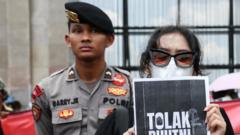Indonesia's new military legislation, allowing active-duty military officials to hold civilian government positions, has led to widespread protests, evoking fears of a return to past authoritarianism. Critics argue that these changes threaten the hard-won democratic progress since Suharto's regime.
Indonesia's Controversial Military Law Sparks Protests and Fears of Authoritarianism

Indonesia's Controversial Military Law Sparks Protests and Fears of Authoritarianism
Legislative changes granting the military a larger role in governance have ignited public outcry and concern over a potential return to dictatorship.
Indonesia's parliament has recently approved contentious revisions to military legislation that significantly increase the military's role in governance, intensifying fears among critics that the nation may regress to the oppressive days of President Suharto's dictatorship, which ended in 1998. The amendments, endorsed by President Prabowo Subianto—a former special forces commander and son-in-law of Suharto—allow serving military officers the opportunity to occupy civilian government roles without having to retire first.
This legislative shift has triggered vigorous protests, with hundreds of pro-democracy activists gathering outside parliament in Jakarta to voice their opposition. Activist Wilson, from the Indonesian Association of Families of the Disappeared (KontraS), highlighted the perilous implications of the revisions. “The essence of democracy is that the military should not engage in politics. Since 1998, there has been a creeping murder of democracy,” he stated.
The changes expand the number of civilian institutions that can be overseen by active military personnel from ten to fourteen and extend the retirement age for high-ranking officers, allowing four-star generals to serve until the age of 63. By Thursday evening, the protesters had swelled to nearly a thousand, bearing banners reading “Return the military to the barracks!” and expressing their discontent with the legislative actions.
Despite efforts over the past 25 years to diminish military involvement in governance, human rights groups, like Imparsial, reported that about 2,600 active-duty officers were already occupying civilian roles before these recent changes were enacted. The legislation symbolizes a potential consolidation of power under Prabowo, suggesting a shift towards stability and state control over democratic values.
For many Indonesians, Prabowo represents a troubling return to the authoritarian past, given his leadership of the special forces unit linked to the abduction of activists in the late 1990s. Since taking office in October 2022, he has increased military involvement in public initiatives, including a significant $4 billion program providing free meals to children and pregnant women.
In defense of the amendments, Defense Minister Sjafrie Sjamsoeddin argued that contemporary geopolitical dynamics necessitate enhanced military transformation to face diverse challenges. However, rights advocates assert that greater military influence in civilian functions threatens impartial accountability.
Concerns center around the potential erosion of the justice system's independence, as active-duty military personnel assume roles within government institutions. Andreas Harsono from Human Rights Watch cautioned that Prabowo's intentions to restore military prominence in civilian matters raise alarms about looming human rights abuses.
Activists remain undeterred, vowing to continue their protests against the military's encroachment into civilian governance. “We will continue protesting until we claim victory... We have no choice but to occupy the 'house of the people',” declared Sukma Ayu, a student from Jakarta, highlighting the ongoing struggle for democratic values in Indonesia.





















